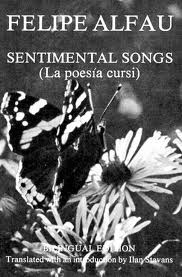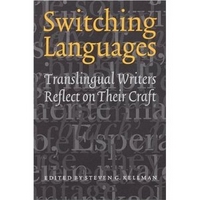Ilan Stavans and the Translingual Express By Steven G. Kellman Ilan Stavans originally conceived
of his 2001 memoir On Borrowed Words
as a quadrilingual text. As he told an interviewer, “It would not only be in English. The first part would be in
Yiddish, the second part in Spanish and the third part in Hebrew and eventually
the fourth part would be in English. In a perfect Universe — at least as
perfect as I envision it — you would start in Yiddish and then slowly as in an
Escher painting the letters would become Spanish and slowly moving into the
tapestry of Hispanic culture and from there moving into Middle Eastern and
Biblical Hebrew and eventually come to English. . . .” [i]
More ambitious than majestic, Stavans’ statement lacks the grandiosity of Holy
Roman Emperor Charles V’s legendary declaration that: “I speak Spanish to God,
Italian to women, French to men, and German to my horse.” However, it does
underscore not only Stavans’ multilingual fluency but also the extent to which
language itself is a central and abiding theme in his work. He in fact
subtitles his autobiography A Memoir of
Language, as if the trajectory of his life is best understood in linguistic terms, as a series of migrations from tongue
to tongue. “Spanish is my right eye, English my left,” he once wrote. “Yiddish
my background and Hebrew my conscience.”[ii]
As much as Carlos Fuentes, Octavio Paz, and other literary puentes he has written about, it is Stavans himself who, spanning the Rio Bravo/Rio Grande divide, has become his generation’s most prominent cultural bridge between Latin America and North America, Jew and Gentile, and academe and the general public. As an editor and literary impresario, he is a conduit between Latino, Jewish, and Sephardic writers and a readership generally unaware of their existence. In Mutual Impressions: Writers from the Americas Reading One Another (1999), Stavans serves as hemispheric intermediary, editor of a collection in which Latin American writers comment on North American writers and North Americans comment on Latin Americans. He also moves easily between a college classroom and a TV studio. As a writer, Stavans traverses the gaps between Spanish and English, as a reader between those and Yiddish and Hebrew. A fascination with the history and mechanics of languages accounts for many of Stavans’ books, including not only On Borrowed Words but also, most obviously, Spanglish: The Making of a New American Language (2003), Dictionary Days: A Defining Passion (2005), Love and Language (2007), and Resurrecting Hebrew (2008). “I find the gallery of words that is a language extraordinarily attractive: I want to know their origin, their conflicting meanings, and the potential they have to express an idea,” he explained.[iii] As a critic, he seems most drawn to writers such as S. Y. Abramovitch (Mendele Mokher Sforim), Hector Bianciotti, Joseph Brodsky, Elias Canetti, Ariel Dorfman, Alberto Gerchunoff, Fernando Pessoa, Richard Rodriguez, Esmeralda Santiago, and George Steiner who, like him, have moved between languages. Stavans championed Locos (1936) and Chromos (1990), inventive but neglected novels written in English by Felipe Alfau, a native of Barcelona who emigrated to the United States, and he translated Alfau’s Spanish poetry into English for a bilingual edition titled Sentimental Songs: La poesía cursi (1992).The
best-known examples of these linguistic migrants are Samuel Beckett, Joseph
Conrad, and Vladimir Nabokov. In a discussion of Biancotti, a native of Argentina who
wrote his first four novels in Spanish before turning to French (“the mother
tongue replaced by the wife tongue”[iv]),
Stavans calls them all “tongue snatchers.”[v]
The metaphor is imprecise. To “snatch” is to seize something hastily and
illicitly, but many of these translinguals – writers who write in more than one
language or in a language other than their primary one – are anything but
hasty. Dorfman’s memoir Heading South, Looking North (1998) recounts the
many years its author spent trying to repress in turn his Spanish and his English
identities, only eventually to embrace both. “I had to work like a coal-miner
in his pit quarrying all my English sentences out of a black night,” complained
Conrad about the ordeal of composing in what was, after Polish and French, his
third language.[vi] Nabokov’s meticulously
reworked English prose is not a snatch. Nor were S. Y. Agnon, Chaim Nachman
Bialik, and Shaul Tchernichovsky robbing anyone when they began writing in
Hebrew, a language each adopted - instead of Yiddish - as a way of reviving the
ancient language and contributing something to a nascent new national identity.
Whether or not Stavans is conscious of the precedent, the term “tongue snatcher” echoes the title of Claudine Herrmann’s 1976 novel Les Voleuses de langue, translated into English in 1991 by Nancy Kline as The Tongue Snatchers. For Herrmann, the regnant patriarchy controls language, and for women to usurp power they must pluck words out of men’s mouths and appropriate them for their own purposes. In a sense, the act of writing is in general an affirmation and demonstration of power, but when Beckett wrote En attendant Godot in French rather than his native English he was not exactly filching from Racine as much as purging his verbal profligacy in a medium that he chose for its austerity, claiming that: “en français c’est plus facile d’écrire sans style”[vii] (in French it is easier to write without style). To understand Stavans’ tendency to regard translingualism as tongue-snatching, it might help to examine his own experiences with language. He has repeatedly described himself as an outsider, from his childhood in Mexico through his travels in Israel and elsewhere to his long-time residence and eventual citizenship in the United States. He grew up in a secure middle-class Jewish enclave in Mexico City that he describes as “an oasis, completely uninvolved with things Mexican.”[viii] After high school, teaching philosophy at a Jesuit institution in downtown Mexico City, Universidad Iberoamericana, where almost everyone else was Gentile and many were anti-Semitic, he was branded as Jewish and not Mexican. When he later moved to the United States, he became Mexican, abruptly forced to assume a new identity: “White Hispanic.” Stavans remains uncomfortable confined to any single identity, or language. But, as he notes: “Discomfort can be a pleasant sensation.”[ix] Discomfort - creative alienation - has been Stavans’ Muse. His vantage point between cultures and between languages has facilitated the остранение (ostranenie) – defamiliarization, making strange – that the Russian Formalists contend is the defining feature of all aesthetic perception and that drives Stavans’ prodigious productivity. A translingual is forced to be attentive to qualities in words and idioms that native speakers usually take for granted. Occupying a space somewhere between Spanish, Yiddish, Hebrew, and English, Stavans is positioned to notice things about each language that monolinguals might ignore.Moreover, Stavans’ congenital discomfort - his acute consciousness of being a Jew in Mexico, a Mexican in the United States, and a writer among non-writers - keeps him from feeling at home in any culture or language. “I only love my country when I am far and away,”[x] he admits, and even the referent of “my country” is ambiguous. His father was a Yiddish actor in Mexico, professionally at odds with his environment, but Stavans recounts his own alienation even from stage performance. Disinclined even to pretend to pretend, he repeatedly refers to himself as an “impostor.” “I am a copy, an instant replay, a shadow, an impostor,” he confesses. “Everything is an echo. To live is to plagiarize, to imitate, to steal.”[xi] According to T. S. Eliot’s famous quip, “Immature poets imitate, mature poets steal.”[xii] A polyglot literary larcenist, Ilan Stavans has matured into a tongue-snatcher of extraordinary energy, range, and accomplishment. ******************************************************************* The Translingual Imagination (2000), and the editor of Switching Languages: Translingual Writers Reflect on Their Craft (2003).
[i] Interview with Robert Birnbaum, January 16, 2002. Identity Theory: www.identitytheory.com/ilanstavans [ii] “Autobiographical Essay.” In Switching Languages: Translingual Writers Reflect on Their Craft , ed. Steven G. Kellman. Lincoln, NE: University of Nebraska Press, 2003, p. 114. [iii] Neal Sokol and Ilan Stavans, Ilan Stavans: Eight Conversations. Madison: University of Wisconsin Press, 2004, p. 19. [iv] Art and Anger: Essays on Politics and the Imagination. Albuquerque: University of New Mexico Press, 1995, p. 205. [v] “Tongue Snatcher.” Art and Anger, pp. 204-9. [vi] Letter to Edward Garnett, 28 August 1908; cited in C. Jean Aubry, ed., Joseph Conrad: Life and Letters, vol. 2. New York: Doubleday, Page and Company, 1927, p. 82. [vii] Niklaus Gessner. Die Unzulänglichkeit der Sprache: eine Untersuchung über Formzerfall und Beziehunglosigkeit bei Samuel Beckett. Zurich, Juris, 1957, p. 32n. [viii] “Autobiographical Essay,” p. 114. [ix] Resurrecting Hebrew. New York: Schocken, 2008, p. 15. [x] “Autobiographical Essay,” p. 117. [xi] “Autobiographical Essay,” p. 122. [xii] “Philip Massinger.” The Sacred Wood: Essays on Poetry and Criticism, 2nd ed. London: Methuen, 1928, p. 125. |
|
ESPECIAL ILAN STAVANS > Sobre el autor >
Steven G. Kelmann (v.o. inglés) |
blog comments powered by Disqus










